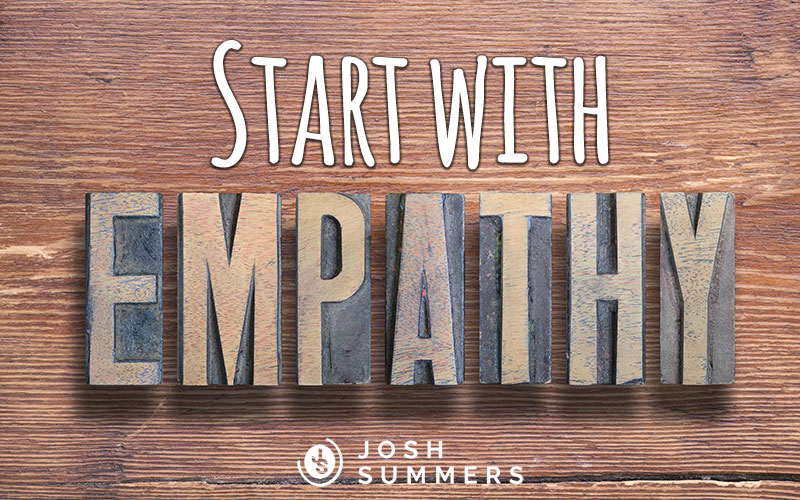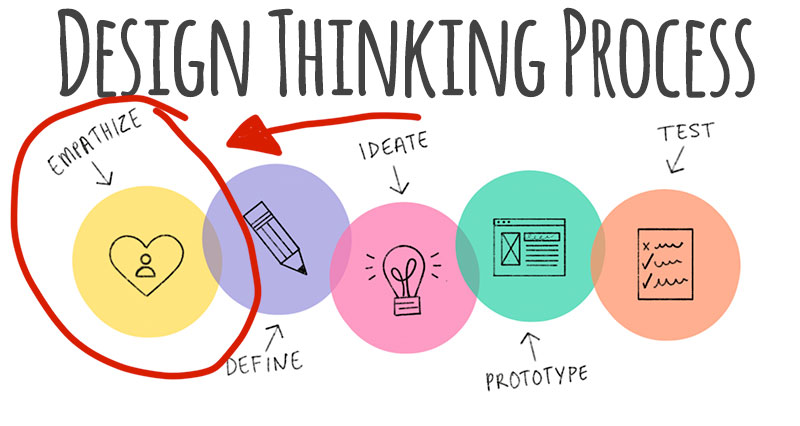As each of us deals with the challenges of this global crisis, it’s critical that we process and react from a place of empathy.

Social media has given us a platform to share our immediate reactions, to theorize without solid information, and to vent our anger without consequence.
Unfortunately, as quick as we are to blame social media or “fake news” for creating an environment full of hysteria, we let ourselves off the hook far too easily.
Guess what?
All of us are pretty selfish, whether we’re keen to admit it or not.
We joked about the virus and how everybody was over-reacting…until it came knocking on our door, wiping away our investments and closing our schools.
We theorized about the severity of the virus, comparing it to the flu and mocking China’s draconian containment measures…then we went into quarantine ourselves.
We started with humor. We started with analysis. We started with answers.
But what we should have started with was empathy.
Before you Theorize…Empathize
There’s a process in business known as Design Thinking that has been used for decades as a strategic way to challenge assumptions and understand the end-user. Companies use it to develop new ideas, new products or unique solutions to everyday problems.
The end goal is to take you down a path of thinking that may not have been evident at first.

The first stage of the process is “Empathize”, and those who work in design thinking will tell you that without it…
…the entire exercise is pointless.
To empathize means to set aside your own assumptions about a problem to allow yourself to see the impact it has on others.”
How can we apply this to our current situation?
Questions That Encourage Empathy
Before you finish your armchair analysis of this global crisis and share your findings on social media, I encourage all of us to ask ourselves a few questions that will encourage empathy.
Who is this really affecting right now?
If it’s not affecting us, we have a tendency to ignore or at least be ignorant to how it affects others. In the same way we don’t give cancer much thought until our family member is diagnosed, it’s hard for us to see the impact of the coronavirus when we don’t personally know anybody who has been infected.
But the only way we’re going to gain any empathy in this crisis is if we take time to understand who this is affecting. It could be…
- …the thousands of Chinese families in Wuhan who had their loved one taken from them;
- …the hourly worker who no longer has a job;
- …the business owner who works in the travel industry.
- …the homeless person who relies on a food pantry to eat, but that food pantry is now closed because all the grocery store shelves have been wiped clean.
I’m sure there are many more if you spend just a few minutes in thought.
What Assumptions Do I Already Have About This?
Social media tends to create an echo chamber of ideas and thoughts that mimic our own. We all knows this, yet we all easily forget it as well.
To develop empathy – a proper understanding of how a problem is affecting people – we need to recognize our own assumptions.
The truth is that we know very little about this coronavirus. Experts think they know where it started; they have theories on how it is spread; they anticipate a certain peak; but when push comes to shove…
…they’ll admit that these are just educated guesses.
Our assumptions have a sneaky way of turning into racism, elitism and know-it-all-ism.
Is There a Way I Can Help?
Once we have a better idea of who is being affected and how our assumptions are getting in the way, our empathy can point us toward what’s next.
- Perhaps I can reach out to that friend who lost their job.
- If you are an influencer in some form, use that influence to encourage your followers to help others.
- Maybe I can donate some of that food I’ve stocked up to the local food pantry.
- As a business owner, I can continue to employ my people with enough for them to pay the bills, even though it would be easier to just terminate some of them.
The Bible instructs us to “bear one another’s burdens” (Galatians 6:2) and to “count others more significant than yourselves” (Philippians 2:3).
This is an invitation to start with empathy.

Thanks for your insightful perspective, Josh. I feel like you wrote this article just for me. Since I work from home and don’t have kids, my life looks very much the same during this time of social distancing and economic chaos. But you helped me remember that that is most definitely not the case for many people. Thanks for the reminder to aim for empathy and to find actionable ways to help.
Thanks so much, Hanna! I appreciate you giving it a read and sharing your thoughts. You’re definitely not alone in that. For most of us, it’s not until we feel the direct pain (in this case: lost investments, quarantine, homeschooling, etc.) that we pay attention and take it all seriously.
With so much hysteria in the recent weeks or months, finally a logical and sensible article to appreciate the perspective of true compassion. The depth of mankind cannot appreciate empathy naturally. It must be provoked and considered before you can begin to touch the surface. And that is just the beginning of truly experiencing empathy for another. Jesus displayed empathy without compromise. As followers of Christ, His example should prompt us to do the same. As a leader in the field of design and as a Christian, this basic textbook analysis is a clear picture of how and why we should lead by example; begin with empathy. Well said Josh. Thank you!
Josh, thanks so much for your thoughts. I confess, I am one who first thinks only of how “this” is affecting me. So I needed this nudge you have given me and others.
Thank you, Jack, for your honesty here. As I said, I think we all do it to some degree or another – it’s part of our human nature. I’m glad to hear this was a positive nudge 🙂
Thank you Josh for your article, it is very well thought out. Even in teaching history to my 5th graders I can use this. It will get those little minds to think outside the box!
Thank you, Trudi! I would be honored if it could inspire some 5th graders 🙂